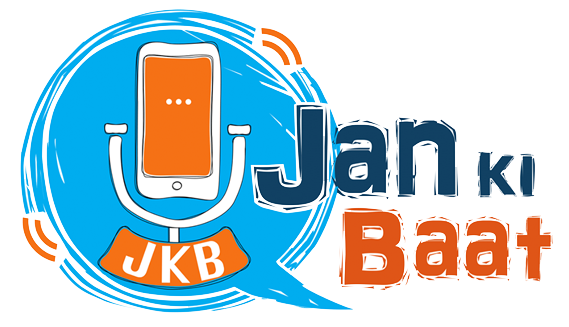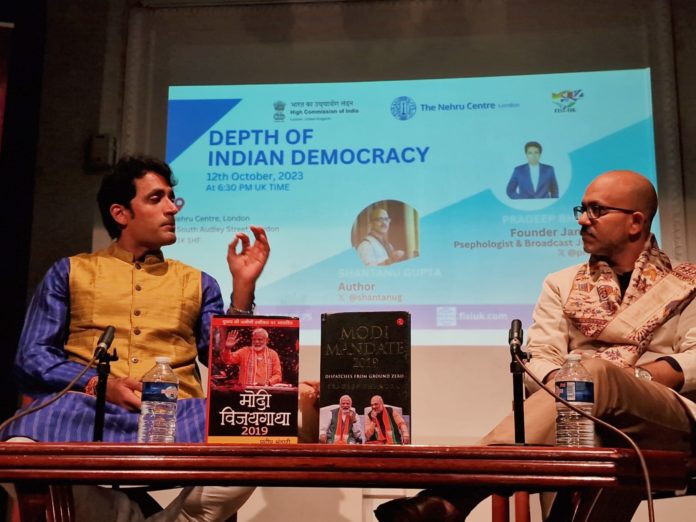In London, Pradeep Bhandari Sheds Light on the ‘Depth of Indian Democracy’
In a captivating event that brought to the forefront the strengths of Indian democracy, Pradeep Bhandari, Founder of Jan Ki Baat and an acclaimed psephologist and broadcast journalist, shared insights that underscore the uniqueness and resilience of India’s democratic system. The event, titled “Depth of Indian Democracy,” took place at the prestigious Nehru Centre in London and was skillfully moderated by the esteemed Indian author and political analyst, Shantanu Gupta.
The discussion revolved around the intricacies of Indian democracy, with Pradeep Bhandari offering a fresh perspective on the role of the Indian voter, the accountability of politicians, inclusivity, and the influence of women in politics. His words provided an invaluable insight into the vibrancy of Indian democracy.
Pradeep Bhandari emphasized the role of Indian voters in shaping political leadership, irrespective of party lines:
“It’s the choice that the party makes, the voter is showing people a mirror across party lines.” This statement underlines the pivotal role of the electorate in determining political leadership in India, where the choice of the voter always reigns supreme.
Highlighting India’s extraordinary inclusivity, Pradeep Bhandari shared a remarkable instance of political diversity:
“In India, it’s not normal when the world started to speak about transgender rights, India elected a transgender, from the SC community, in an MLA election. This doesn’t happen everywhere”. This case highlighted by Pradeep Bhandari exemplifies India’s commitment to a representative democracy where diverse voices are not just heard but also represented in positions of power.
Bhandari also recognised the sagacity of Indian voters:
“The Indian voter defeated a majority government after the imposition of emergency, and when the Indian voter gets that respected government after four terms & after two decades of coalition politics, then the Indian voter, despite all the political calculations, votes for a completely government for two successive terms.”
Through this, he underlined the Indian voter’s ability to elect and change governments based on merit and performance, a testament to the robustness of India’s democratic processes.
Acknowledging the rising influence of women in Indian politics, Pradeep Bhandari made a compelling point
“No politician can win without the women’s vote, and women have become the veto voter in the parliament. Whether it is gender sensitisation or women empowerment, World should learn only from one democracy, which is the Indian democracy.”
By shedding light on the growing significance of women voters in Indian politics, Pradeep highlighted that Indian women aren’t just participants in the electoral process but also play a decisive role in shaping the nation’s democratic landscape.
Pradeep Bhandari also emphasized the stark contrast in the way Western media reports on India’s politics. He asserted, “There were newspapers that said European lockdown during Covid was very good, but when India imposed the lockdown a year later, they published the story questioning why India imposed a lockdown without asking and consulting everyone.” This double standard in reporting is glaring and raises important questions about the fairness of media coverage.
Moreover, he underscored India’s changing role on the global stage. He states, “For me, India is no longer positioning itself as a swing power, it’s positioning itself as the leading power.” This shift in global status challenges those who have traditionally controlled the global narrative and puts India at the forefront of significant international events, such as the G20 summit hosted in the country.
The Friends of Indian Society International (FISI), UK, showcased their commitment to strengthening the ties between the United Kingdom and India while promoting meaningful dialogues on India’s social and cultural issues. Their dedication to fostering a deeper understanding of India’s vibrant democracy and diverse society is truly commendable. FISI’s efforts in organizing this event at the esteemed Nehru Centre in London allowed attendees to gain valuable insights from Pradeep Bhandari and Shantanu Gupta, making it a resounding success.
Under the skillful guidance of FISI Executive Member Vinay Pujari and the heartfelt vote of thanks delivered by FISI Executive Member Sushil Rapatwar, the event ran smoothly, leaving the audience both inspired and intrigued. It is in the tireless efforts of individuals like Madhuresh Mishra, the President of FISI, and other esteemed members like Sweta Bhatia, Manoj Mishra, and Sushil Rapatwar, that events like these become possible. Their dedication to bridging cultural and societal divides and facilitating a global understanding of India’s democracy is truly praiseworthy.
In a world that increasingly values cross-cultural dialogues and diverse perspectives, organizations like FISI, UK, play a pivotal role in promoting and celebrating India’s vibrant democracy. They provide a platform for insightful discussions that inspire individuals and urge them to actively share the story of India’s democratic strength with the world. As India continues to position itself as a leading global power, the work of FISI and similar organizations becomes ever more significant, fostering stronger bonds between nations and promoting a deeper understanding of the world’s largest democracy.

